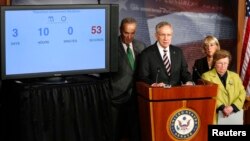CAPITOL HILL —
In a high stakes budget battle, the U.S. Senate has passed a bill to keep funding the federal government, stripping out a provision pushed by House Republicans to cut off funds for President Obama's health care law. The amdended bill now goes back to the Republican-controlled House of Representatives, putting pressure on House Speaker John Boehner to take action before a midnight Monday deadline to avert a partial government shutdown.
As the Pentagon and other government agencies prepare for a possible shutdown Tuesday, the Senate has passed a funding bill that would keep the government running, without defunding the health care law. The final vote approving the "clean" spending measure was 54 to 44.
Republican Senator Ted Cruz led the fight on the Senate side to derail the federal funding measure unless it stopped funding for the president's landmark health care reform law passed four years ago. Senator Cruz said the battle will continue, and called on House Republicans not to give in to pressure to avert a shutdown.
"But the good news is the process is not over," he said. "It is going to go back to the House of Representatives, and I salute the House for having had the courage to stand up and fight and defund Obamacare. And I remain confident, hopeful and optimistic the House will stand their ground, and will continue the fight."
Senate Democrats accused a group of the most conservative Republican lawmakers of recklessly endangering U.S. and world financial stability by tying routine measures such as funding the government and raising the debt ceiling to their fight against an increased federal role in health care, backed by Democrats.
"These radicals in the House and Senate have driven America from crisis to crisis," said Senate Majority Leader Harry Reid. "We lurch from crisis to crisis leaving a trail of economic destruction behind."
Now the spotlight shifts back to the House side, where House Republicans must decide what to do next on the temporary funding bill, known as a "CR." Republican House Speaker John Boehner has repeatedly had problems getting a group of about 40 of his most conservative members to go along with compromises on must-pass legislation. Boehner faces two imminent challenges: first, avoiding the shutdown; and second, raising the national debt ceiling, which the Treasury says needs to happen by October 17. Boehner will likely need Democratic votes to pass the measures.
Democratic House Minority leader Nancy Pelosi indicated that Democrats are willing to compromise with Republicans on the CR to fund the government.
"Don't expect us to be helpful when it comes to the debt ceiling, because we don't think that is negotiable," she said. "But let's' see what we can do working together for the CR [continuing resolution to fund the government]."
But Democrats, including President Obama, have made clear the debt ceiling must be raised, and they will not negotiate with Republicans who want to attach other measures to it. The House will meet on Saturday, but it is not yet clear when they will vote on a measure to fund the government, just three days ahead of the shutdown deadline.
As the Pentagon and other government agencies prepare for a possible shutdown Tuesday, the Senate has passed a funding bill that would keep the government running, without defunding the health care law. The final vote approving the "clean" spending measure was 54 to 44.
Republican Senator Ted Cruz led the fight on the Senate side to derail the federal funding measure unless it stopped funding for the president's landmark health care reform law passed four years ago. Senator Cruz said the battle will continue, and called on House Republicans not to give in to pressure to avert a shutdown.
"But the good news is the process is not over," he said. "It is going to go back to the House of Representatives, and I salute the House for having had the courage to stand up and fight and defund Obamacare. And I remain confident, hopeful and optimistic the House will stand their ground, and will continue the fight."
Senate Democrats accused a group of the most conservative Republican lawmakers of recklessly endangering U.S. and world financial stability by tying routine measures such as funding the government and raising the debt ceiling to their fight against an increased federal role in health care, backed by Democrats.
"These radicals in the House and Senate have driven America from crisis to crisis," said Senate Majority Leader Harry Reid. "We lurch from crisis to crisis leaving a trail of economic destruction behind."
What Does a US Government Shutdown Mean?
What Does a U.S. Government Shutdown Mean?- Large parts of the federal government need to be funded each year to operate
- If Congress cannot agree on how to fund them, those parts of the government shut down
- During a shutdown, federal workers are separated into excepted and non-excepted employees
- Excepted must continue to work, and will be paid when Congress funds the government again
- Non-excepted are furloughed and not guaranteed to receive back-pay
- Parts of the government dealing with national security and public safety and those with independent funding like the Postal Service continue to operate
- Other parts shut down, including National Parks, the EPA and the processing of visa and passport applications
- The last government shutdown lasted 21 days and ended on January 6, 1996
Democratic House Minority leader Nancy Pelosi indicated that Democrats are willing to compromise with Republicans on the CR to fund the government.
"Don't expect us to be helpful when it comes to the debt ceiling, because we don't think that is negotiable," she said. "But let's' see what we can do working together for the CR [continuing resolution to fund the government]."
But Democrats, including President Obama, have made clear the debt ceiling must be raised, and they will not negotiate with Republicans who want to attach other measures to it. The House will meet on Saturday, but it is not yet clear when they will vote on a measure to fund the government, just three days ahead of the shutdown deadline.





